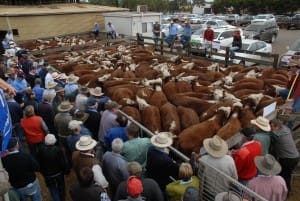
Agents are required by legisaltion to collect compulsory transaction levies, but receive no compensation for that role.
Without someone to collect compulsory levies each year, hundreds of millions of dollars worth of levy-funded marketing and research and development programs in the Australian livestock industry would grind to a sudden halt.
Under the Federal Primary Industries (Excise) Levies Act 1999, that responsibility falls on the shoulders of stock and station agents, lot feeders and meat processors, who are mandated to collect compulsory levies at various points of the livestock supply chain and transfer those funds onto the Government’s Levies Revenue Service (LRS).
It is a critical role without which livestock industry R&D and marketing programs could not function.
But it is also a role for which the mandatory collection agents receive no reward or fee in return for their service.
With Senators this week conducting an inquiry into agricultural levy arrangements, the peak body representing stock and station agents, the Australian Livestock and Property Agent’s Association, has urged them to consider recommending a fairer system of compensation for agents in return for providing the mandatory levy collection role.
“There is a great benefit for industry by these levies being collected by livestock agents, however there are no benefits, only costs, for the collection agent in performing this task on behalf of industry,” ALPA says in its submission to the inquiry.
“Any collection and remitting by agents for a third party is at a cost to the agent, in time, staff, computer changes and bank and audit fees, to name a few.
“Holding the monies for a period of time is inadequate compensation to the agent for these costs, red tape and time imposts.
“ALPA would like to see fair compensation offered to collection agents who are providing a valuable service to industry and government’s pro bono.”
The mandatory requirement for agents to collect levies had also created the misconception among producers that all of the charges removed by agents from sale proceeds are the agents’ own charges, ALPA says: “This misconception is detrimental to an agent’s business.”
The current levy system also amounted to a confusing and time-consuming tangle of red tape for agents when dealing across federal and state jurisdcations.
ALPA chief executive officer Andy Madigan told Senators during a public hearing in Sydney this week that the inquiry should be expanded to investigate all livestock levies paid by producers that agents are required to collect on behalf of Government, at State as well as Federal level.
Different states charged flat rate per head levies while others imposed percentage-based levies that varied depending on volumes transacted, and all tended to work on different reporting and remitting periods.
Collecting levies according to the varying Federal and State requirements added up to a significant time and cost burden for agents, particularly large agencies such as Elders, Landmark and Ruralco which have branches in every state.
ALPA is recommending the introduction of a streamlined national levy system, which would see States charge a uniform flat-rate-per-head levy that is added to the current Levies Revenue Service (LRS) transaction levy collected by a vast number of collection agents nationally.
Sheep should change to flat rate levy
It is also recommending that percentage-based levies for sheep, lamb and goats be replaced with a single flat rate per head system, as used in the cattle industry.
This would provide the sheep and goat industries for the first time with true statistics on the number of sheep, lambs and goats sold.
ALPA says the current percentage-based levy does not offer such surety, with numbers reported being just guestimates, which was “a grossly inadequate outcome” for the industry.
A simplified flat-rate-per-head method, based on the same approach used with cattle levies, would also make the collection, accounting process including auditing, a lot easier for collection agents, producers and the LRS.
ALPA’s suggested improvements would also include a requirement for the Levies Revenue Service to develop and maintain a register of all levies paid by each individual levy payers, recording vendor identification, numbers of livestock sold, type of livestock sold and the amount of levy paid.
“All of this information is presently required to calculate and deduct levies, but is not reported,” ALPA says.
“This valuable statistical information will aid with MLA voting rights amongst other beneficial possibilities for the entire livestock industry.”
Levy exemptions in exceptional circumstances
ALPA has urged senators to recommend the introduction of a “hardship moratorium” which would allow producers to be excused from paying levies while they are experiencing exceptional circumstances.
“This would give these producers some much needed cost relief, such as those affected by the current drought, floods or fires for example. This proposal could work quite easily as a ‘claim back’ scheme by the levy paying producer.”’
Ag levy inquiry public hearings underway
The Senate Standing Committee on Rural and Regional Affairs and Transport has been conducting public hearings in Sydney, Canberra and Melbourne this week as part of its inquiry into industry structures and systems governing the imposition of and disbursement of marketing and research and development (R&D) levies in the agricultural sector.
Links to submissions made to the inquiry by prominent cattle and beef industry organisations can be accessed below, while all 148 submissions that were lodged can be accessed on the committee’s website here
- Australian Livestock Exporter’s Council
- Cattle Council of Australia
- Australian Meat Processor Corporation
- Australian Meat Industry Council
- LiveCorp
- Australian Lot Feeders Association
- Australian Livestock & Property Agents Association
